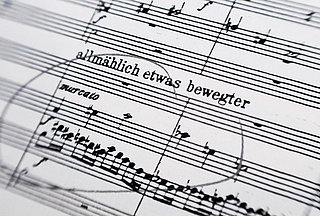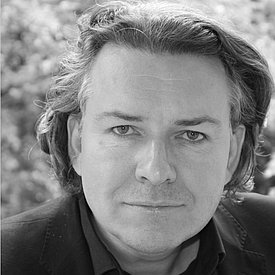Bachelor of Music -
Composition/Music Theory
Hearing and brain.
The Cologne University of Music and Dance offers a four-year Bachelor's degree course and a two-year consecutive artistic Master's degree course in composition / music theory. After four semesters, students can choose between a pedagogical and an artistic profile (formerly "pedagogical composition" and "artistic composition"). The composition/music theory course offers a particularly broad-based education. It teaches artistic-practical, academic and pedagogical skills in the areas of composition, music theory and composition. In addition to classical composition theory, the course includes the acquisition of music analytical, stylistic and music historical knowledge, the methodology and didactics of the subject area, the artistic-practical use of modern notation and production software as well as the planning and realization of own productions and performance projects. The aim is a comprehensive creative and post-creative development of the aesthetic diversity of music in the past and present.
If you have any questions about the course, please get in touch with the relevant contact person(s).
Basic information
| Degree | Bachelor of Music |
|---|---|
| Period of study | 8 Semester |
| Course begin | Wintersemester |
| ECTS points | 240 Credits |
| Major subjects | Tonsatz |
| Continuing study options | Master of Music Music Theory |
Application and aptitude test
Applications are submitted online via the muvac platform. All information on the procedure can be found on our application page.
Admission requirements
- General university entrance qualification or a comparable university entrance qualification
- Proof of a TestDaF 3 language certificate for non-German-speaking applicants
- Successfully passed aptitude test
Qualifying examination
The aptitude test consists of four parts:
- Main subject examination (colloquium) (approx. 20 minutes)
- Written sub-main subject examinations (aural training approx. 60 minutes, composition approx. 3 hours)
- Artistic-practical examination in the instrumental main subject (approx. 10 minutes)
- Artistic-practical examination in the instrumental minor subject (approx. 10 minutes)
Detailed information can be found in the Qualifying Examination Regulations, in particular in the appendix for content requirements and conduct of the examination.
Course of studies and examination regulations
The program is divided into a basic study period (1st and 2nd year) with a high proportion of compulsory modules and a differentiated main study period (3rd and 4th year). The structural framework is formed by 7 main modules:
- Core module
- Artistic-practical context
- Education
- Mediation
- Professionalization
- Bachelor thesis / Interdisciplinary project
- Supplement
Teachers
Musiktheorie / Tonsatz / Gehörbildung
Musiktheorie, Tonsatz, Gehörbildung
Tonsatz
Tonsatz und Gehörbildung
Tonsatz, Gehörbildung
Tonsatz/Musiktheorie
Current events
Kammermusiksaal Köln


Contact

|
johannes.schild@hfmt-koeln.de |
|
| Address |
Hochschule für Musik und Tanz Köln Unter Krahnenbäumen 87 50668 Köln |

Vice Dean Department 1
|
qiming.yuan@hfmt-koeln.de |
|
| Address |
Hochschule für Musik und Tanz Köln Unter Krahnenbäumen 87 50668 Köln |